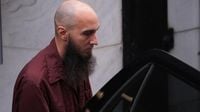In a chilling episode that has sent shockwaves through Pennsylvania and beyond, Cody Balmer, a 38-year-old man from Pennsylvania, pleaded guilty to a violent arson attack at Governor Josh Shapiro’s official residence in Harrisburg. The attack, which unfolded in the early hours of April 13, 2025, while the governor and his family slept, has been described by Shapiro as a harrowing ordeal that will leave lasting scars on those involved.
According to the Dauphin County District Attorney’s Office, Balmer admitted to a litany of charges, including attempted murder, aggravated arson, 22 counts of arson, burglary, terrorism, aggravated assault, reckless endangerment, and loitering. The plea, entered on October 14, 2025, resulted in a sentence of 25 to 50 years in state prison. Balmer will not be eligible for parole until he is 63 years old, a fact that underscores the severity of his crimes and the threat he posed to the governor’s family and guests.
Prosecutors detailed how Balmer scaled an iron security fence surrounding the historic governor’s mansion, broke a window with a sledgehammer, and hurled Molotov cocktails—beer bottles filled with gasoline, reportedly siphoned from a lawn mower—into the residence. The attack took place just hours after the Shapiro family had hosted a Passover Seder, a significant Jewish holiday, welcoming more than two dozen guests into their home. At the time of the assault, Governor Shapiro, his wife Lori, three of their four children, 15 guests, and two Pennsylvania State Police troopers were inside the mansion. Miraculously, all were evacuated safely, though the building sustained millions of dollars in damage, as reported by the Associated Press.
Surveillance video released by prosecutors captured the terrifying moments as Balmer broke into the house, ignited fires in multiple rooms, and attempted to break through doors leading to the sleeping quarters of the governor’s family and guests. "It’s hard for me to stand before you today and utter the words 'attempted murder' when it’s your own life—to know that someone tried to kill me," Shapiro said during a press conference, as quoted by NBC News. "It’s especially hard to know that he tried to burn our family to death while we slept." The governor, visibly shaken, added, "The hardest part has been trying to explain it to our four children and to our nieces and nephews. I’ve carried with me this enormous sense of guilt—guilt that doing this job that I love so much has put our children’s lives at risk. It’s been really hard."
Balmer’s motive, as revealed in court documents and his own statements, was rooted in his opposition to Shapiro’s stance on the ongoing war in Gaza. After fleeing the scene, Balmer called 911, confessed to the crime, and stated that Shapiro "needs to know that he will not take part in his plans for what he wants to do to the Palestinian people." In a letter from jail to the Associated Press, Balmer insisted that the governor’s faith was not a factor, writing, "He can be Jewish, Muslim, or a purple people eater for all I care and as long as he leaves me and mine alone." Nevertheless, authorities noted that Balmer harbored significant animosity toward Shapiro and was prepared to use violence had he come face-to-face with the governor. He told police he would have beaten Shapiro with a hammer if given the opportunity.
The attack took place against a backdrop of rising political violence in the United States. As the BBC and other outlets have reported, the incident joins a troubling list of recent threats and attacks targeting public officials, including the attempted kidnapping of Michigan Governor Gretchen Whitmer, two assassination attempts against President Donald Trump, and the killing of commentator Charlie Kirk. Shapiro, a Democrat who has served as Pennsylvania’s governor since 2023 and was once considered a top pick for the vice presidency, has spoken forcefully about the dangers of political extremism. "Political violence shouldn’t be accepted as the normal course of business for elected officials," he told reporters, lamenting that the risks, once "theoretical," have now become all too real for him and his family.
Judge Deborah Curcillo, who presided over the case, called the security footage "horrific" and "very frightening." The governor and his wife, Lori, submitted a victim statement to the court describing how the attack left them "feeling exposed in unimaginable ways," and spoke of "a fear and anxiety we are learning to live with." The emotional impact on the Shapiro family has been profound, with the governor acknowledging that "this is an ongoing thing that we are dealing with… We also know it’s going to always be with us."
Balmer’s defense attorney, Bryan Walk, stated that his client "is taking full responsibility" and "paying a hefty price for a man who’s 38 years old." Family members of Balmer, in a letter read in court, revealed that he had stopped taking his medication, leading to manic episodes and a "dark and difficult path." Court proceedings were delayed for a period while Balmer received mental health treatment. His mother told the Associated Press that she had tried to get him assistance for mental health issues, but "nobody would help." In a brief video interview from prison, Balmer said, "Does anyone ever consider children? It doesn’t seem that way. I sure as hell did. I’m glad no one got hurt."
The governor’s mansion, constructed in 1968, suffered extensive damage in the attack. The fire charred walls, furniture, and even a piano, and exposed a lack of basic fire safety features—the building had no sprinklers. Repairs and security upgrades are ongoing, as the state seeks to restore both the physical structure and the sense of safety that was so abruptly shattered.
Politicians from both sides of the aisle widely condemned the attack, underscoring the need for unity against political violence. Shapiro, for his part, has called on Americans not to become "numb" to such incidents. "Before this attack, those risks just felt very theoretical to me, something that might happen elsewhere to someone else, but couldn’t happen here," Shapiro said. "Sadly, this made it all real."
For Governor Shapiro and his family, the aftermath remains a journey of recovery and resilience. "We will forever be changed by this," he said, "we know that time will heal, but the scars will remain." As Pennsylvania continues to grapple with the consequences of this attack, the hope is that renewed attention to security, mental health, and the dangers of political extremism can help prevent future tragedies.


